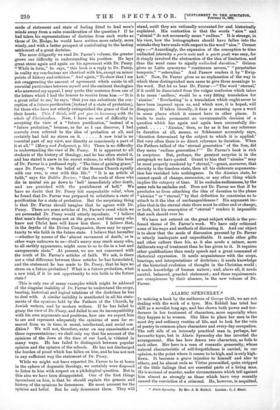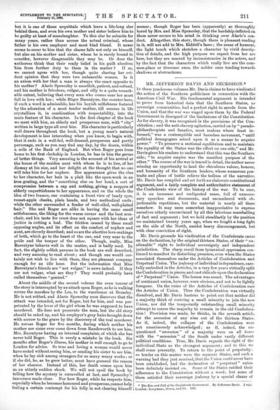ALARIC SPENCELEY.* IN noticing a book by the authoress of
George Geith, we are not dealing with the work of a tyro. Mrs. Riddell has tried her skill as a novelist long ago, and has shown both power and ten- derness in her treatment of characters, more especially when they happen to be women. She likes to place her men in the most dry and ordinary routine of life, and to look for the vein of poetry in common-place characters and every-day occupation. The soft side of an intensely practical man is, perhaps, her favourite topic, but in Alaric Spenceley she has inverted the arrangement. She has here drawn two characters, as foils to each other. Her hero is a man of romantic generosity, whose natural characteristic of self-forgetfulness is carried, in our opinion, to the point where it ceases to be high, and is only high- flown. It becomes a grave injustice to himself and also to others, and he almost ends as Virtue personified, quite stripped of the little failings that are essential parts of a living man. He is accused of murder, under circumstances which tell against him almost as strongly as those which have very recently caused the conviction of a criminal. He, however, is acquitted,
• Aiaric Spenceley. By Mrs. J. H. Riddell. London : C. J. Skeet.
but it is one of those acquittals which leave a life-long slur behind them, and even his own mother and sister believe him to be guilty at least of manslaughter. To this slur he submits for many years, rather than accuse the actual criminal, whose father is his own employer and most kind friend. It never seems to occur to him that the shame falls not only on himself, bat also on his mother and sister, whom he is surely bound to consider, however disagreeable they may be. Or does the authoress think that their ready belief in his guilt absolves him from further duty to them in the matter ? If so, we cannot agree with her, though quite sharing her evi- dent opinion that they were two unbearable women. Is it an axiom with her that a man is always the exact opposite to his mother ? Alaric Spenceley is unselfish, patient, and refined, and his mother is frivolous, vulgar, and silly to a quite remark- able extent, believing that every man who comes near her mast fall in love with her ; while Rbger Barentyne, the counter-hero, if such a word is admissible, has his boyish selfishness fostered by the adoration of a most tender mother, till success in life crystallizes it, in combination with respectability, into the main feature of his character. In the first chapter of the book 'we meet with him, an elderly and prosperous man, with " city" written in large type all over him. His character is particularly well drawn throughout the book, but a young man's natural development is less interesting when you know, to begin with, that it ends in a well-fed, well-dressed, prosperous and portly personage, such as you may find any day, by the dozen, within a mile of the Bank of England. But when Roger goes from home to his first clerkship in London, be has in him the germs of better things. Very amusing is the account of his arrival at the house of the maiden aunt with whom he is to live, of her dismay at his size, and her delight at the thought that no one will take him for her nephew. Her appearance gives the clue to her character, her hair in a plait like the open-work in an iron grating, and the " something else on her head, a sort of compromise between a cap and nothing, giving a souppon of -elderly coquettishness to her appearance, and on the whole the idea of two frames, one containing a front view of beady eyes, russet-apple cheeks, plain bands, and two methodical curls ; while the other surrounded a fender of well-oiled, well-plaited hair." She and Roger are alike in having the same small selfishnesses, the liking for the warm corner and the best arm- chair, and his taste for crest does not square with her ideas of justice in cutting a loaf. The friction caused by these small -opposing angles, and its effect on the comfort of nephew and aunt, are cleverly described; and so are the abortive love-makings of both, which go to the heart of the one, and very near to the pride and the temper of the other. Though, really, Miss Barentyne behaves well in the matter, and is badly used. In fact, the slightly selfish persons in the book are well described, and very amusing to read about ; and though one would cer- tainly not wish to live with them, they are pleasant company enough for an idle hour. But the information that Miss Barentyne's friends are " not vulgar," is news indeed. If they are not vulgar, what are they? They would probably have called themselves "genteel."
About the middle of the second volume the even tenour of the story is interrupted by an attack upon Roger, as he is walking across the marshes by the Lea, to the warehouse at Bromley. He is not robbed, and Alaric Spenceley soon discovers that the attack was intended, not for Roger, but for him, and was per- petrated by the lover of the girl whom he was supposed to have murdered. He does not prosecute the man, lest the old story should be raked up, and his employer's grey hairs brought down with sorrow to the grave by the discovery of the real murderer. Be nurses Roger for five months, during which neither his mother nor sister ever come down from Randsworth to see him, Mrs. Barentyne having an internal complaint, of which she has never told Roger. This is surely a mistake in the book. Six months after Roger's illness, his mother is well enough to go to London for advice. So true and loving a woman would never have rested without seeing him, or sending his sister to see him, when he lay sick among strangers for so many weary weeks ; or if she did, he, as he grew better, must have guessed the reason of her absence. Instead of this, her death comes upon him as an utterly sudden shock. We will not spoil the book by telling how the mystery is unravelled at last, and Spenceley's innocence made clear. Nor how Roger, while he respects him, especially when he becomes honoured and prosperous, cannot help feeling a certain contempt for his folly in not clearing himself sooner; though Roger has been (apparently) so thoroughly bored by Mrs. and Miss Spenceley, that the hardship inflicted on them never occurs to his mind in thinking over Alaric's con- duct. Altogether, this story, though there is pleasant reading in it, will not add to Mrs. Riddell's fame ; the sense of humour, the light touch which sketches a character by vivid descrip- tion of details, and the high purpose we expect from her are here, but they are marred by inconsistencies in the actors, and by the fact that the characters which really live are the com- mon-place or tiresome ones, the nobler ones tending towards shadows or abstractions.















































 Previous page
Previous page